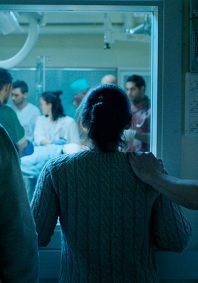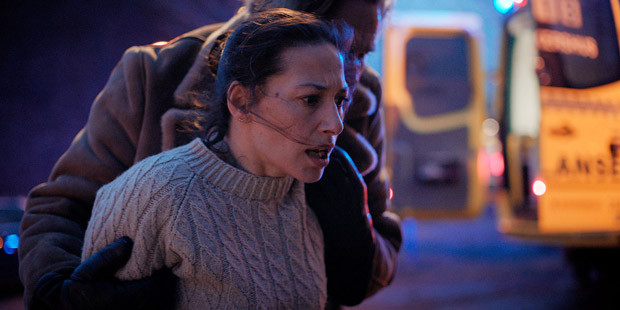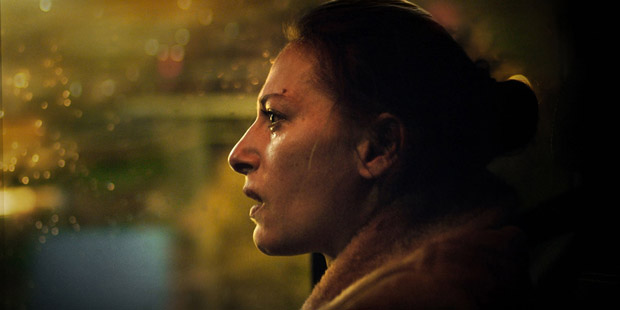
Tuva Novotnys instruktørdebut, Blind Spot, blev for første gang vist udenfor de norske grænser på årets TIFF, og i den anledning satte vi os ned med Novotny og skuespiller Pia Tjelta for at tale lidt om deres svære one-take film med et vigtigt budskab.
You’re the writer and the director of this movie. How did you decide to tell this story?
Tuva Novotny: Well I just felt that there was a general lack of psychological tools both personally and in society in terms of addressing mental illness. How we talk about it and I think today we are pretty good at acknowledge that you know that it’s okay to suffer from mental illness, as before when it was more dogmatized. But still there is also risk for leaving it there and letting it be an identity to suffer from mental illness, and what I wanted to do, is to work preventative, I wanted to put a focus on, there are things we can do, there are places to go, there are things we can be better at.
The film is in one long take and usually when you do that it’s from somebody’s perspective it’s told, but in this film, it changes to the mom’s perspective. What was the reason to change it like that?
Novotny: Well, I mean, I’ve been working with movies since I was very young, you know, so I have this internal and spinal sense of storytelling in a movie format, so I needed it to have a turn and a mid-point. Working without cuts and editing, I felt it natural to write the story that way. So, there are several reasons both the kind of dramatical craft, but there is also my wish of telling the story from different perspectives in terms of getting everyone’s view on and experience on this kind of situations, like the mother’s, hospital workers and the groups experience.
I was wondering, as an actor is it a nightmare working with these extremely long takes?
Pia Tjelta: No absolutely not, it felt very risky, I was very afraid. But it also gave enough to the project and to the situation that I think the project is. It favors the project in a way. So, it was kind of exhausting, it felt like extremes sports in a way, and she just threw me out, just like” you can go”!
Novotny: You can fly!
Tjelta: So, of course it was a lot of different thoughts and emotions about it, but it was definitely not a nightmare at all, no.

How is it to be directed by an actor, is it easier?
Tjelta: Yes absolutely, of course the best thing is, that we know each other very well from before, and that was also something that gave a lot of safety. I felt very secure and that she would help me and she would tell me if she wanted something to be different, or I felt very safe in the project, and that is what you dream of as an actress; to have your director’s hand slightly on your back all the time compared to when you feel alone with a director, but here I did not feel alone any moment, even though I was actually physically alone during the movie. It was a contradiction in a way. I was only with Tuva and the camera, but I did never feel alone, because Tuva has been acting for so many years. She was also able to push on the right buttons for me to speak with a language that I can understand. She was able to help me.
Is that how you would describe your directing as well?
Novotny: Well, I mean, I definitely know the feeling of being alone with a director who doesn’t understanding the pain you go through in a way, but I’ve experienced a lot of directors misinterpreting the relation between an actor and a director working as satellite. I think for me if everything is to be optimized or work in higher end, you need to work together, and to work together you need to have loyalty and safety and trust. So, for me it should be obvious in any workspace that you work on those fundaments, but it isn’t unfortunately, so yes, it’s important to me.
Usually when you make a film a lot can change, was there anything in this production that you originally didn’t thought it was going to be?
Novotny: There was one thing that changed, and there was very little that changed. I’m surprised because we had a lot of research and we’ve had a lot of pre-production, because we didn’t have a lot of money to shoot with, so we knew that when we were going to shoot, it had to be that. So I’m amazed to see that the movie is, almost down to the comma and sentence, what was in the script, but the one big thing that changed was that I had written the scene where the mother and the grandfather is in the ambulance with the girl, and then when I had my researchers with me, co-workers from the paramedic-teams, they were like ”they wouldn’t be allowed to go in the ambulance. We would send an ambulance and a doctor.” and I’m like ”What?! Oh my god, so we aren’t going to be able to do that scene?! How is that going to work out” But then I realized it was actually for the better, I loved the fact that she is not in the ambulance with her child because that would almost have been too much, you know.
Tjelta: And then it would have looked like an American movie.
Novotny: Yeah, like a classical movie with like ”please don’t die!”, you know, so I was so happy, and I had to fight with the producers because they were like ”oh my god we are losing the most dramatical scene of the movie and I just felt it was a blessing for the movie that it changed.”
Tjelta: But for me it was also a change because when I had worked with the script I had thought it was that way it was going to be, so I also had to direct it in my head, but I also felt like it was something that gave you something to the scene that she cannot reach her. She cannot get close to her and then there is a forced distance to the child.”
Novotny: And I think that actually it is the most dramatical scene when she is in the car behind, because for me, drama is not when someone is screaming or crying bits, it’s when you can feel the drama in the situation, then the scene, like the one before, you’re so much in the chock as an audience as well, so it’s first afterwards it becomes the drama. I’m very happy about that change.

Another thing I wanted to ask about is the sound. How did you get such a good sound, when everything is in one take?
Novotny: I was so lucky to have the finest sound engineer, Kenneth Gustavsen, and the finest sound designer, Peter Albrechtsen, who has worked on an international level, so we had a couple of test runs, where we just walked through the locations and tried to set up, because none of us had ever tried it before, so we tried to set up a structure, that would work; and we talked about different base stations, but in the end we actually just worked with two boomers and dubbing up the micro ports and with really good equipment of course, so that was expensive.
Tjelta: Yeah, I looked like The Matrix underneath.
Novotny: But it was necessary that we had the sound and that there weren’t going to be any necessary ADR. We did kind of tweak and turned some stuff, but not because it was necessary. I’m so happy for that. It can be a big gamechanger.
Was there any particular scene that was your favorite?
Novotny: It’s the one I’ve mentioned, the scene that wasn’t originally written like that. I’m so happy and very humble for the scene, and I promised myself because I’ve read a lot about previous one-shot movies, Victoria for example, where they had shot it and then went home and wrote for a couple of days and then shot it again. And I didn’t have the money to do that, so I was like ”This needs to be sharp! We need to shoot what’s in the script, because I don’t have money to go home and work for a couple of days.” But that change luckily came in at a time in the process, where you had time to change it. So, I was so happy, I mean, I loved the fact that we are not in the drama, but we’re like in an ambulance. And I love that we are also shooting it in Scandinavia where we’re on the real highway with real cars, I loved that.
Tjelta: My answer to that question is no. I do not have a favorite.
Was it difficult for you to film the entire time?
Tjelta: No, not difficult but demanding.
Would you consider directing again? Is this something you like doing?
Novotny: Yes. I just finished my second movie, which is coming out this Christmas, so yes that’s what I’m doing.
Is there anything in particular you hope that the audience will take away from the film? Something they would think about?
Novotny: Yeah, I mean distributing the movie in Norway, we’ve had a huge network of psychiatrists or organizations working with preventing methods against mental illness or suicide cases and so on. We don’t have that showing here in TIFF for example or in Copenhagen where we will show it at the CPH:PIX. So, I’m a bit nervous to show the movie without that whole kind of structure around it. But having said that, the experience from showing the movie in Norway has been that people actually get the message. It’s kind of obvious what we want to say, you’re not alone, talking about it helps, and there are numbers to call.
Tjelta: I also experience that parents watching the movie respond to me in a way, that they will be more awake in terms of being present in their kids’ lives and follow up on things and talk about things. So, that’s part of our mission in a way.
Novotny: Yeah, I think the audience is already kind of taking that with them, also I would say under that mission with the movie, I hope that there is also another level of understanding that a smiling face isn’t always a happy face. And that’s what they are shocked about.
Det danske publikum kan allerede se Blind Spot til årets cph:pix, der løber fra d. 27. september til d. 10. oktober.